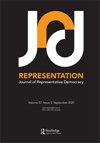选举威权主义与代表权问题:以埃塞俄比亚的奥罗米亚咖啡为例
Q2 Social Sciences
引用次数: 1
摘要
摘要本文分析了奥罗米亚州议会在埃塞俄比亚选举独裁政治格局中的代表性和合法性。这篇文章揭示了在1991年后的联邦制度中,在埃塞俄比亚的“民主化”实验中,Caffee、民选代表和选民之间的相互作用。本研究的实证数据是在2019年2月至2020年6月期间,通过定性研究方法从奥罗米亚州的五个地区收集的,即东古吉和西古吉、波拉纳、西瓦拉加以及芬芬恩周围的奥罗米亚特区。采访了土著机构(Gadaa系统)领导人、社区成员、长老、Caffee成员和地方政府当局。对有意挑选的线人进行了10次焦点小组讨论和30次关键线人访谈。研究结果表明,当选代表与其选区在代表性、问责制和沟通方面存在很大分歧,即政党忠诚凌驾于代表对宪法、选区和良心的责任之上。因此,埃塞俄比亚在国家和地方各级都体现了选举威权主义,选举被用作巩固执政党权力的战略,而不是民主活动。本文章由计算机程序翻译,如有差异,请以英文原文为准。
Electoral Authoritarianism and the Question of Representation: The Case of Caffee Oromia, Ethiopia
ABSTRACT This article analyses aspects of representation and legitimacy of Caffee Oromia (the legislative council of the Oromia National Regional State) within Ethiopia’s electoral authoritarian political landscape. The article sheds light on the interplay between the Caffee, elected representatives and constituencies in Ethiopia’s ‘democratisation’ experiment within the post-1991 federal system. The empirical data for this research were collected from five zones in Oromia, namely East and West Guji, Borana, West Wallaga and Oromia Special zone surrounding Finfinne between February 2019 and June 2020 through qualitative research methodology. Leaders of indigenous institution (Gadaa system), community members, elders, members of the Caffee and local government authorities were interviewed. Ten Focus Group Discussions (FGDs) and 30 key informant interviews were conducted with purposively selected informants. The research findings show that there is a big rift between the elected representatives and their constituencies in terms of representation, accountability and communication whereby party loyalty overrides representatives’ accountability to the constitution, constituencies and conscience. Thus, Ethiopia exemplifies electoral authoritarianism both at national and sub-national levels, whereby election is used as a strategy of power consolidation of the ruling party rather than as a democratic exercise.
求助全文
通过发布文献求助,成功后即可免费获取论文全文。
去求助
来源期刊

Representation
Social Sciences-Sociology and Political Science
CiteScore
3.50
自引率
0.00%
发文量
31
期刊介绍:
This change in scope follows two paths. Firstly, it seeks contributors who are interested in exploring the interface between democratic practice and theory. In particular, this focus seeks contributions that apply theoretical insights to actual examples of current practice. Secondly, while not neglecting the current focus of the journal, we would like to expand its international coverage so that the journal will offer our readers insights in the state of democracy worldwide.
 求助内容:
求助内容: 应助结果提醒方式:
应助结果提醒方式:


